The Fact Some Black People & Black Africans Don't Believe in Sunscreen or Skin Cancer is Embarrassing!
The comments from darker skin Blacks about using sunscreen is outright saddening & embarrassing
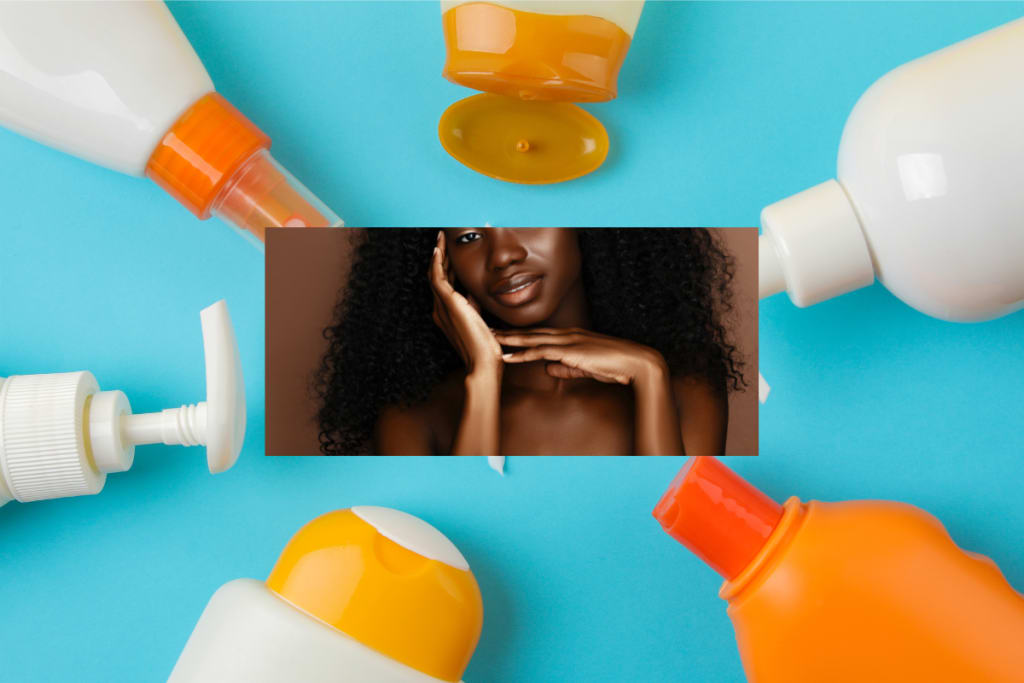
Thursday, 15 June 2023
By: TB Obwoge
Black people are notoriously famous for claiming that certain illnesses don't touch us because of our race. I can clearly remember the beginning the the Covid-19 pandemic, I remember a former associate pulling me close.
He whispered in my ear proclaiming that Black people can't catch Covid-19, he said some things that Black medical care workers had told him about the early Covid patients. He said in with a whisper louder than a slamming door, "Tracie white folks the ones catching this Covid, not us!"
He was possibly correct about the earlier cases of Covid-19, however in the United States Covid ravaged the Black American community.
Living in African countries even during the Covid-19 pandemic, Kenyans and Ghanians also proclaimed that Covid-19 was a virus for the foreigners. Laughing while breaking the Covid restrictions was common practice.
Black Americans as well as Black Africans also rebuke mental illness, therapy and seeking mental health treatment as well.
The African continent has the highest rates of suicides yet the lowest mental health professionals as well. There continent is overwhelmed by terrorism, physical abuse, poverty as well as other societal ills.
The human mind isn't meant to deal with the oppression found within many communities within Africa and Black America. Yet millions of people are facing issues that are incomprehensible to any other race on the planet.
Americans with darker complexions still face a real risk from the sun, many dermatologists say, including a higher risk of death if they do get melanoma. Those same experts stress everyone should wear sunscreen to protect against forms of skin cancer and other harmful effects.
Do People of Color Need Sunscreen?
Dark skin doesn’t need sunscreen, right? Wrong. It’s a common but mistaken belief that having more melanin, the biological pigment in skin that determines its shade, protects darker-skinned people from the sun.
But people with dark skin tones, of any race or ethnicity, are still susceptible to sun damage such as sunburn, hyperpigmentation, skin cancer and premature aging.
“Melanin is thought to be about an SPF of 4, so it is not enough to protect you from the sun,” says UNC Health dermatologist Priyanka Vedak, MD.
How the Sun Damages Skin—Even Darker Skin
Sun damage can occur no matter your skin tone. Ultraviolet rays from the sun cause cellular damage in the skin. Any time you get a sunburn, that’s a sign of damage to your DNA. The greater your exposure to the sun, the greater your risk of damage.
Darker skin may not show visible signs of sun damage as readily, but it’s still happening. In a survey of people of African ancestry based in the United Kingdom, 52.2 percent reported a history of sunburn.
“While it may be harder to notice redness on sunburned skin in darker skin tones, patients will still frequently experience warmth, increased skin sensitivity, tightness and itchiness,” Dr. Vedak says.
Sun damage can also lead to hyperpigmentation, in which patches of skin become darker than the normal surrounding skin. Post-inflammatory hyperpigmentation occurs when your skin produces too much melanin after it has been irritated or injured, such as by the sun.
“Excess sun exposure can worsen skin conditions that result in hyperpigmentation, and many patients with darker skin types visit a dermatologist due to concerns regarding skin pigment changes,” Dr. Vedak says.
Topical creams, gels or a trip to a dermatologist can help treat hyperpigmentation, but sometimes the condition is permanent.
Lastly, excess sun exposure leads to photoaging, which is premature aging of the skin that tends to worsen over time because of chronic sun exposure. This can happen in all skin tones. Photoaging manifests as fine lines, wrinkles, skin texture changes and benign lesions
According to the Skin Cancer Foundation, the estimated five-year melanoma survival rate of Black patients is only 71 percent, compared with 93 percent for white patients. Black patients are more than three times as likely to be diagnosed with melanoma at a more advanced stage than non-Hispanic white patients. This could stem from a lack of awareness and socioeconomic factors such as barriers to care. In the past two decades, melanoma incidence has risen by 20 percent among Hispanic people.
Source: HealthTalk UNCHealthCare.Org

This screenshot is from a Facebook Reel, which are videos posted onto the social media platform. The white mother is rubbing sunscreen lotion onto her biracial son. She is saying she doesn't care that people continue to tell her that her son doesn't need sunscreen.
There were several people arguing in the comments section, all arguing about Black people needing sunscreen or not needing sunscreen. One woman says since she's never been sub-burned that she also can't get skin cancer.
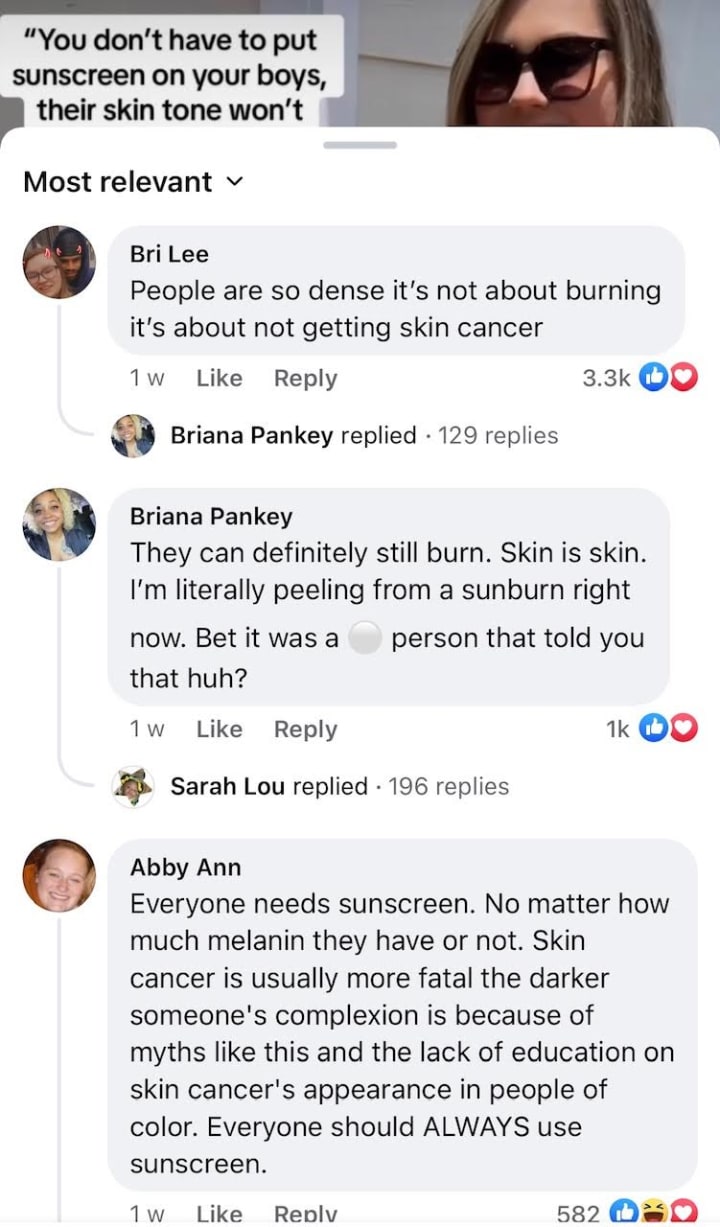
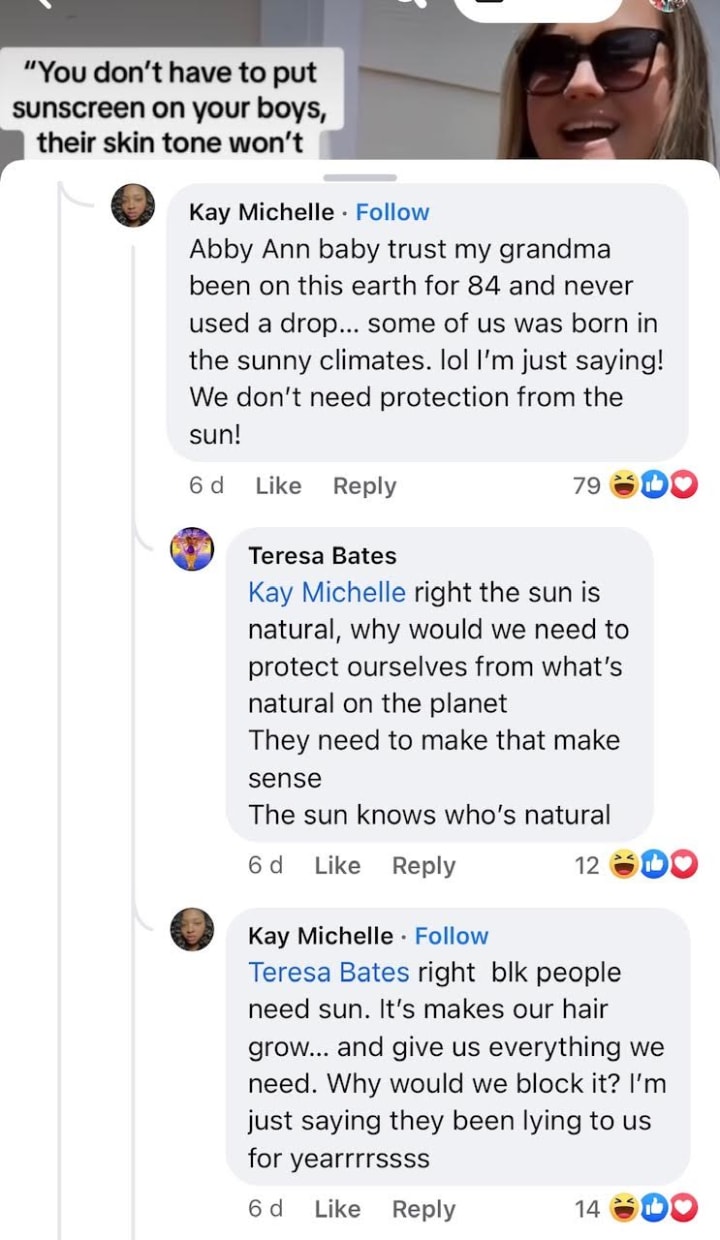
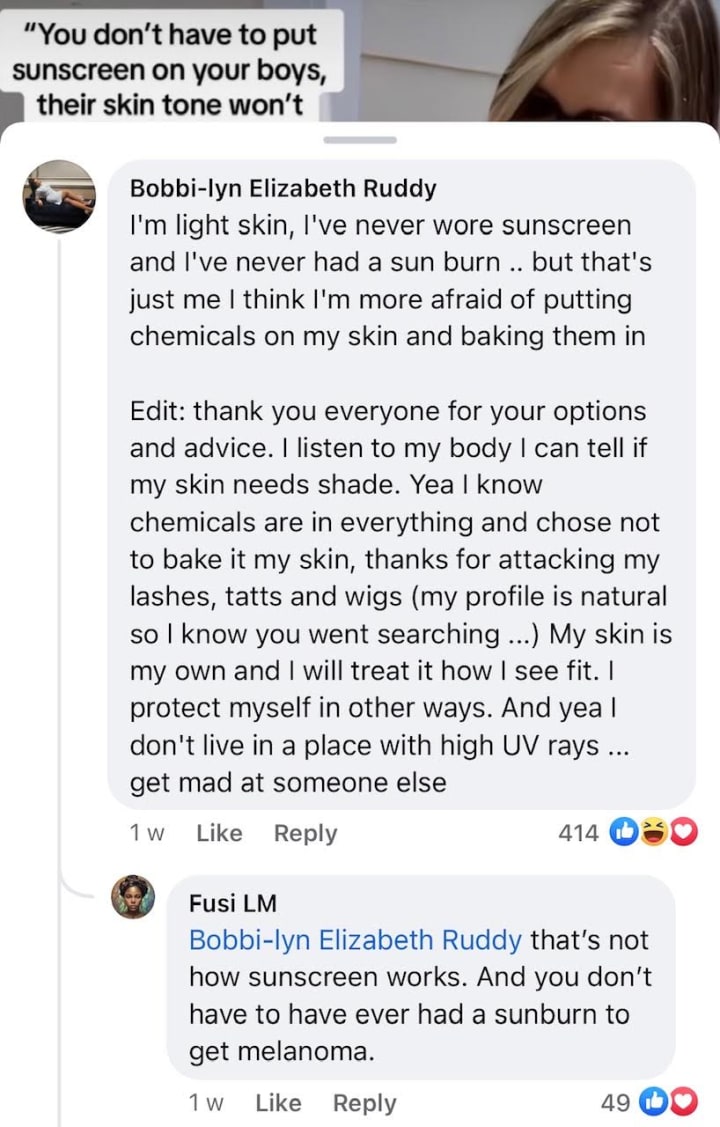
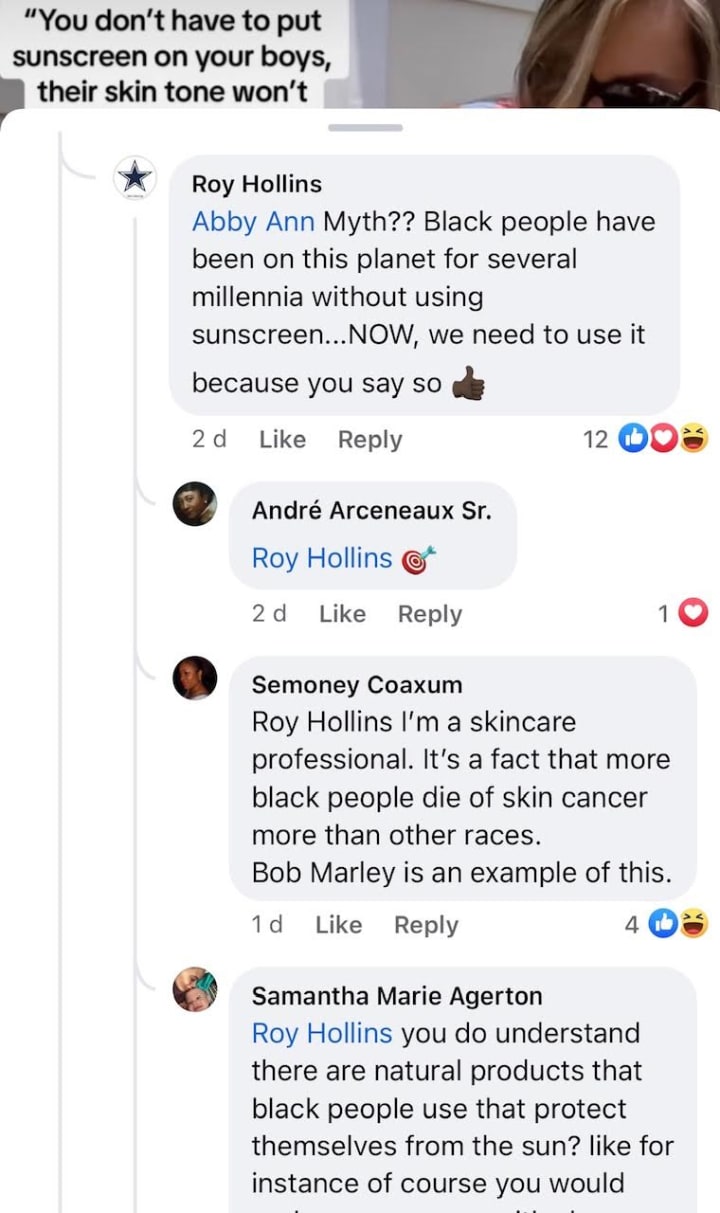
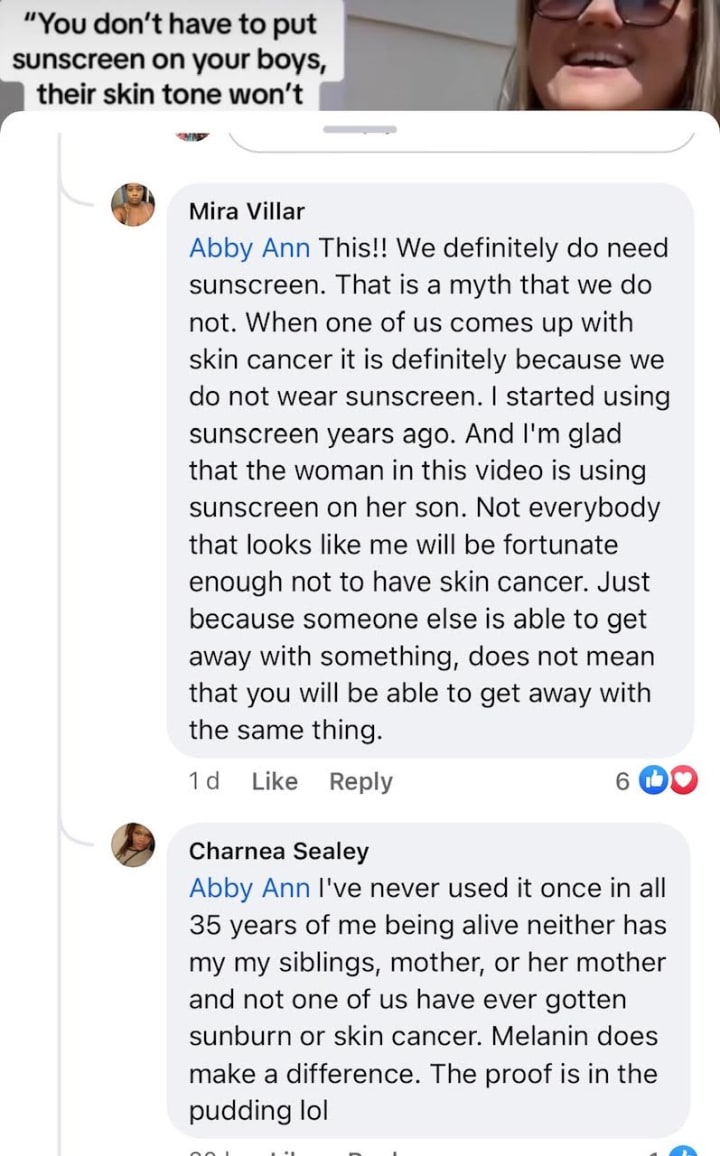
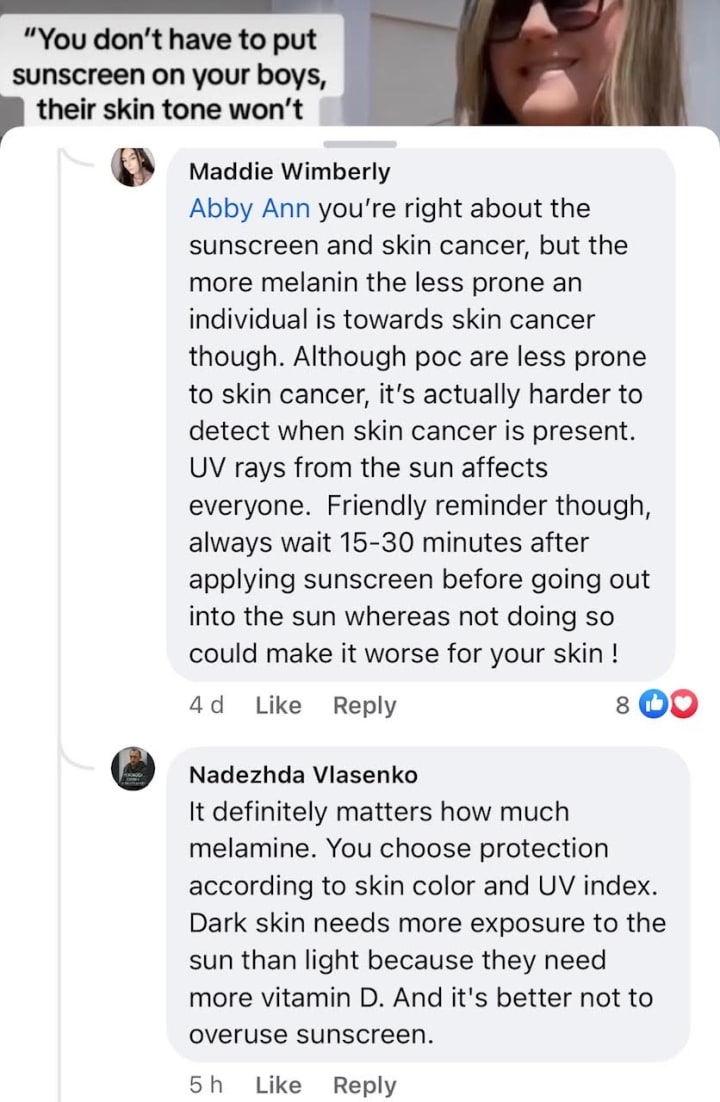
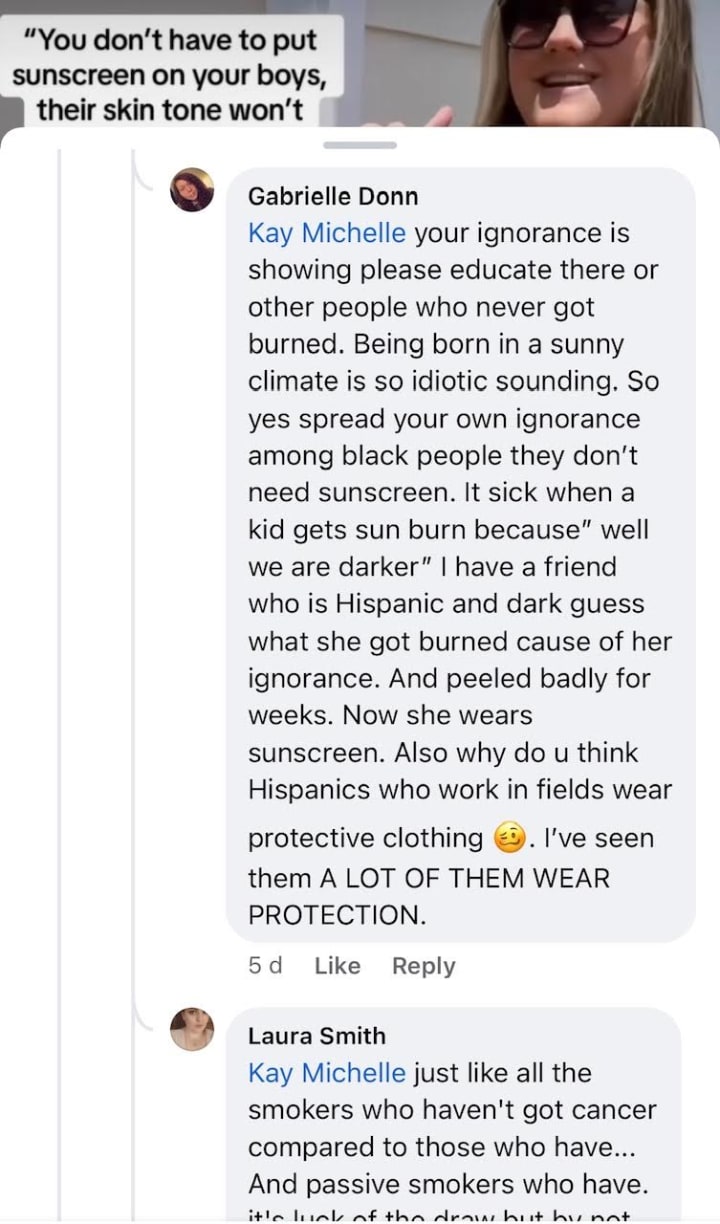
About the Creator
IwriteMywrongs
I'm the president of a nonprofit. I've lived in 3 countries, I love to travel, take photos and help children and women around the world! One day I pray an end to Child Marriages, Rape and a start to equal Education for ALL children 🙏🏽
Enjoyed the story? Support the Creator.
Subscribe for free to receive all their stories in your feed. You could also pledge your support or give them a one-off tip, letting them know you appreciate their work.






Comments
There are no comments for this story
Be the first to respond and start the conversation.